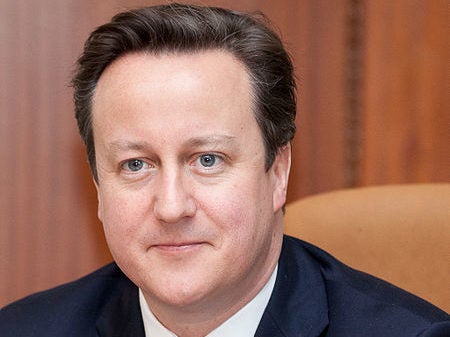
Victims of “serious media intrusion” were told by then Prime Minister David Cameron that the second part of the Leveson Inquiry would go ahead, the High Court has been told.
Cameron (pictured) made a “clear and unambiguous commitment” at a meeting in November 2012, while he was still in office, that Leveson Two would proceed, Lord Justice Davis and Mr Justice Ouseley were told.
The meeting was with press intrusion victims Christopher Jefferies, Kate McCann and Jacqui Hames, who, along with Gerry McCann, are challenging the Government’s decision to cancel part two of the inquiry.
Helen Mountfield QC, representing the four, told the High Court yesterday: “It is common ground that the claimants have been caused huge pain and harm by the misconduct of the media.
“The pain is ongoing … although none of them are here today, it is a painful thing to keep going over and over these things.”
Leveson Two was due to look into unlawful conduct within media organisations as well as relations between police and the press.
But Culture Secretary Matt Hancock announced in March that reopening the “costly and time-consuming” inquiry – which reported on press regulation and ethics in 2012 – was not “the right way forward”.
The decision was taken jointly by Hancock and then-Home Secretary Amber Rudd.
Mountfield said there “could hardly be matters of greater public importance” than the issues Leveson Two was due to look into.
She argued the decision to cancel it was “unlawful” because the four had a “legitimate expectation” following the meeting with Cameron that it would go ahead.
“The Prime Minister’s commitment to the claimants created a substantive legitimate expectation that part two of the inquiry would proceed,” Mountfield said.
“But it did mean … that if the defendants were minded to go back on the Prime Minister’s commitment they were required to take such an expectation into account as an obviously relevant factor when they took the decision. They did not do so.”
Lawyers for the Government argued whatever Cameron said at the meeting “cannot and does not give rise to a binding obligation” to proceed with the second part of the inquiry.
They also complained about a “covert recording” made of the 2012 meeting, which was only recently disclosed to the Government’s legal team.
Nathalie Lieven QC, representing the secretaries of state, said: “The defendants have not resisted the application to admit this evidence, because it is relevant and will have to be considered, but submit that the manner in which it has been obtained and used is far from satisfactory.
“These matters go to the degree to which a statement made in these circumstances can give rise to a legally binding obligation on the Government.”
Bristol landlord Jefferies, who was libelled by the press when he was wrongly accused of the murder of Joanna Yeates in 2010, told the inquiry he was “vilified” by the media.
The McCanns complained of press intrusion into their lives after their daughter Madeleine went missing on holiday in Portugal in 2007.
Former detective and Crimewatch presenter Hames received apologies and damages from News Group Newspapers, part of News UK, and Trinity Mirror over phone hacking and other illegal activity.
Hames had said after Hancock’s announcement that the Conservatives had broken a promise by former Prime Minister Cameron to finish the inquiry and she had “no confidence” in the Government.
Sir Brian Leveson heard the first part of the inquiry, which cost the taxpayer £5.4m, over 17 months and delivered his report in 2012.
In a letter to Rudd dated January 23, Sir Brian said he believed the bulk of the inquiry’s scope should go ahead.
Cameron said when he announced the original inquiry in 2011 in response to a wave of public anger over alleged phone-hacking by the now-defunct News Of The World that it would be divided into two parts.
Hancock said there had been “significant progress” in the practices of the press and the police, including the creation of the new Independent Press Standards Organisation, since Sir Brian’s report.
The hearing is due to continue on Friday, with the court expected to reserve its ruling to a later date.
Picture: State Chancellery/Flickr
Email pged@pressgazette.co.uk to point out mistakes, provide story tips or send in a letter for publication on our "Letters Page" blog
